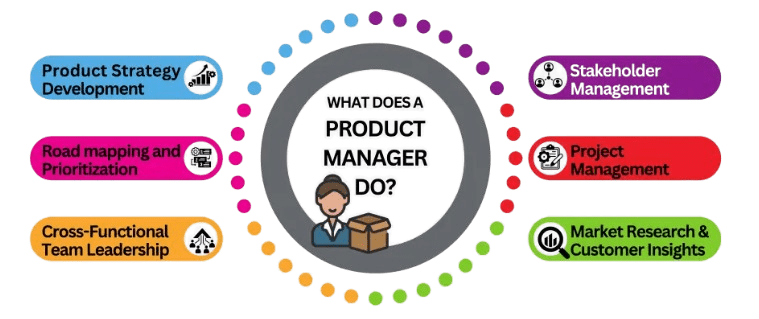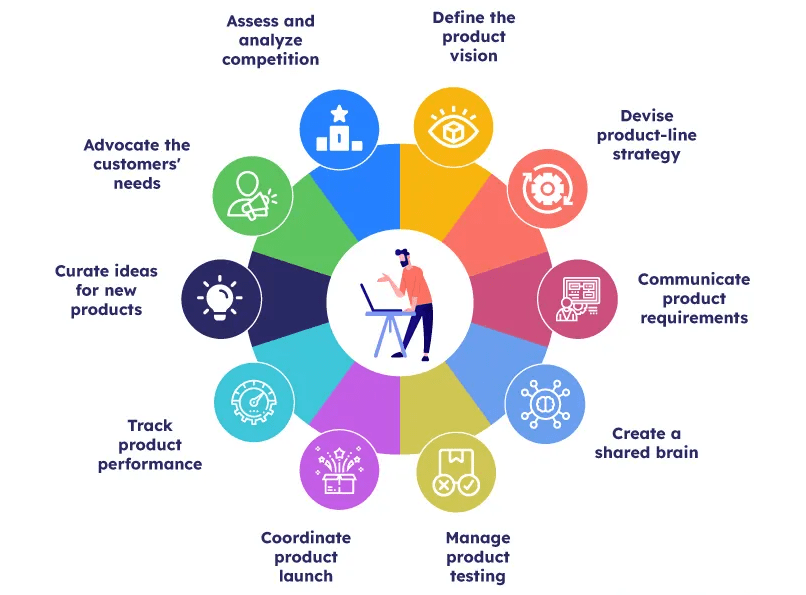
- Introduction to Product Manager Salaries
- Entry-Level Product Manager Salary
- Mid-Level Product Manager Salary
- Senior-Level Product Manager Salary
- Salary Variations by Industry
- Additional Benefits and Perks
- Freelance vs Full-Time Salary Comparison
- Conclusion
Introduction to Product Manager Salaries
The role of a product manager (PM) is vital in driving the development, launch, and ongoing improvement of products that align with business goals and customer needs. As organizations increasingly rely on innovative products to stay competitive, the demand for skilled product managers has surged making it one of the most sought-after and well-compensated roles in the tech and business sectors. In PMP Training, a product manager’s compensation often reflects their strategic responsibilities, industry expertise, and direct impact on company growth. Salaries for PMs can vary widely depending on factors such as experience level, geographic location, industry sector, and the size of the organization. In addition to base salaries, many product managers receive performance bonuses, stock options, and comprehensive benefits packages, significantly increasing their overall compensation. These incentives are particularly common in technology firms and high-growth startups. This guide explores salary ranges across different experience levels from entry-level to senior and executive roles as well as variations across industries and regions. It also offers practical tips on negotiating higher pay, understanding total compensation packages, and leveraging certifications and skills to boost earning potential in the dynamic and rewarding field of product management.
Do You Want to Learn More About PMP? Get Info From Our PMP Certification Training Today!
Entry-Level Product Manager Salary
Entry-level associate product managers or junior product managers typically have 0 to 2 years of experience and play a supportive role within product teams. Their responsibilities often include conducting market and user research, analyzing data, coordinating with cross-functional teams, and managing small product features or specific projects under the guidance of more senior product managers. PMBOK Sixth Edition is Here! What Project Managers Should Know this role serves as a valuable foundation for understanding the product development lifecycle and gaining hands-on experience in a real-world business environment. In terms of compensation, entry-level product managers in the United States typically earn between $70,000 and $100,000 per year, depending on the company, location, and individual qualifications. In regions like India or Southeast Asia, the salary range is generally lower, averaging between ₹6–12 lakhs annually, though it may vary with company size and demand.

Entry-level PMs usually hold a bachelor’s degree in business, marketing, computer science, or a related field. Some may also have completed relevant internships or obtained certifications such as the Certified Scrum Product Owner (CSPO) to strengthen their qualifications. With experience and demonstrated success, these professionals can quickly progress into mid-level roles with higher pay and expanded responsibilities.
Mid-Level Product Manager Salary
- Experience Level: Mid-level product managers typically have 3 to 5 years of experience and are responsible for managing full product lines or key features with minimal supervision.
- Salary Range (U.S.): In the United States, mid-level PMs earn between $100,000 and $140,000 annually. This can increase based on company size, location, and industry.
- Global Variations: In countries like the UK and Canada, salaries range from £60,000 to £90,000 or CAD 90,000 to CAD 120,000. In India, mid-level PMs earn between ₹15–30 lakhs ($18,000–$36,000) per year.
- Bonuses and Equity: In Free Float Vs Total Float, many mid-level PMs receive performance-based bonuses, equity, or stock options, especially in tech companies and startups, which can significantly enhance total compensation.
- Industry Impact: PMs in industries such as tech, fintech, and healthcare generally earn on the higher end of the pay scale due to demand for innovation and domain expertise.
- Skills Required: Strong analytical skills, product strategy experience, stakeholder communication, and data-driven decision-making are essential at this level.
- Career Advancement: Mid-level PMs often move into senior or lead product roles, with potential salary jumps and greater strategic influence.
- Experience Level: Senior product managers typically have 5 to 10 years of experience and are responsible for leading major product initiatives, managing cross-functional teams, and influencing business strategy.
- Salary Range (U.S.): In Scrum Master or Product Owner, senior PMs in the United States earn between $140,000 and $180,000, with top tech firms offering packages that can exceed $200,000 annually.
- Global Salaries: In the UK, senior PMs earn between £80,000 and £120,000, while in India, salaries range from ₹30–50 lakhs ($36,000–$60,000), depending on the company and location.
- Additional Compensation: Many senior PMs receive bonuses, equity, and stock options, especially in large tech companies or high-growth startups, significantly boosting total compensation.
- Industry Influence: Tech, fintech, and SaaS industries offer the most competitive salaries due to the strategic role senior PMs play in product innovation and revenue growth.
- Key Skills: Leadership, advanced analytics, product vision, stakeholder management, and deep market knowledge are critical at this level.
- Growth Path: Senior PMs often progress to Group Product Manager, Director of Product, or VP of Product roles, with corresponding increases in pay and responsibility.
- Stock Options and Equity: Many companies, especially startups and tech firms, offer stock options or equity grants. These can significantly boost long-term earnings if the company performs well or goes public.
- Performance Bonuses: In addition to base salaries, product managers often receive annual or quarterly bonuses tied to individual, team, or company performance.
- Health and Wellness Benefits: Comprehensive health insurance (medical, dental, vision), mental health support, gym memberships, and wellness stipends are common perks offered to PMs.
- Flexible Work Arrangements: In Project Documentation & its Importance, many organizations offer remote work options, flexible hours, or hybrid models, promoting work-life balance and increased productivity.
- Professional Development: Companies may cover the cost of certifications, online courses, industry conferences, or training programs to support continuous learning and skill advancement.
- Paid Time Off (PTO): Generous vacation days, sick leave, and parental leave are often included in PM compensation packages to support personal and family well-being.
- Retirement and Financial Planning: 401(k) matching, pension plans, and access to financial advisors help PMs plan for long-term financial security.
Would You Like to Know More About PMP? Sign Up For Our PMP Certification Training Now!
Senior-Level Product Manager Salary

Salary Variations by Industry
Product manager salaries vary significantly across industries, influenced by factors such as revenue models, profit margins, and the pace of technological innovation. In the technology sector, companies like Google, Amazon, and Microsoft offer some of the highest compensation packages, with senior product managers often earning over $200,000 annually, thanks to high demand for innovation and complex product ecosystems. In PMP Training, it is noted that in finance, including fintech and traditional banking, product managers earn competitive salaries ranging from $110,000 to $180,000, driven by the industry’s need for secure and scalable digital products. In the healthcare and pharmaceutical sectors, product managers typically earn between $90,000 and $160,000, with those possessing specialized knowledge in medical products or regulations commanding higher pay. The e-commerce and retail industries offer salaries between $80,000 and $150,000, often supplemented with performance-based bonuses tied to sales outcomes. At startups, base salaries tend to be lower, ranging from $60,000 to $100,000. However, many startups offer equity or stock options, which can lead to significant long-term financial rewards if the company succeeds. Overall, industry choice plays a crucial role in shaping a product manager’s earning potential and career trajectory.
Looking to Master PMP? Discover the PMP Masters Program Training Course Available at ACTE Now!
Additional Benefits and Perks
Freelance vs Full-Time Salary Comparison
Freelance product managers often operate under a different income structure compared to their full-time counterparts. Instead of a fixed annual salary, freelance PMs typically charge clients on an hourly or project basis. Hourly rates can range from $50 to over $200, depending on the freelancer’s expertise, industry focus, and project complexity. Project-based pricing is also common for defined scopes of work, allowing for flexibility in engagements. Annual earnings for freelance product managers generally fall between $80,000 and $250,000, though actual income can fluctuate based on workload, client demand, and market conditions. In What is Performance Reporting in the Project Management, high-performing freelancers with niche expertise or strong networks can exceed these averages, especially if they take on multiple concurrent projects or work with well-funded startups and enterprises. In contrast, full-time product managers benefit from steady salaries, job security, and additional perks such as healthcare, retirement plans, and paid time off. However, freelancers often have the potential to earn more due to higher hourly rates, particularly on short-term or specialized projects. While freelancing offers greater autonomy and income flexibility, it also requires strong self-management, marketing skills, and the ability to handle variable workloads. Both paths offer rewarding opportunities, depending on one’s career goals and working style.
Preparing for PMP Job? Have a Look at Our Blog on Project Management Interview Questions & Answer To Ace Your Interview!
Conclusion
Product management is a rewarding and dynamic career path with strong salary potential and opportunities for advancement. Product managers play a critical role in guiding products from conception to launch, making strategic decisions that directly impact business success. As a result, their contributions are highly valued across industries such as technology, finance, healthcare, and e-commerce. Salaries for product managers vary based on factors such as experience, location, company size, and skill set. Entry-level PMs typically earn competitive salaries, while those with several years of experience or who manage complex product portfolios can command significantly higher compensation in PMP Training. In major tech hubs or high-demand industries, product managers often receive additional perks such as stock options, bonuses, and flexible working arrangements. To maximize earning potential and career growth, product managers should invest in professional certifications, such as Certified Scrum Product Owner (CSPO) or Pragmatic Institute certifications. Developing strong negotiation skills and engaging in continuous learning through courses, workshops, and industry events also enhances marketability. With the right approach, product management offers a fulfilling career path with financial stability, professional development, and the opportunity to drive meaningful impact within an organization.


